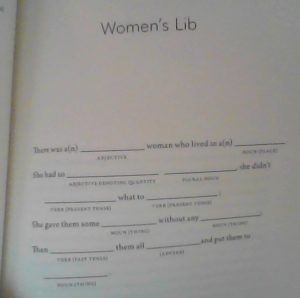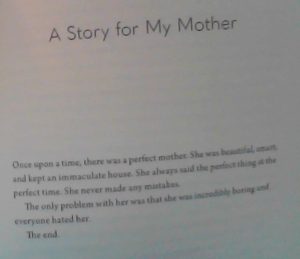Theric Jepson reviews Irreversible Things by Lisa Van Orman Hadley, Pillar of Light: Joseph Smith’s First Vision by Andrew Knaupp and Sal Velluto, and Hermana by Becca McCulloch.
.
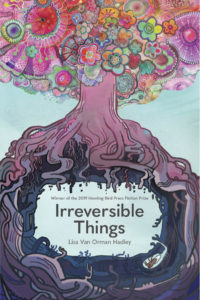 033) Irreversible Things by Lisa Van Orman Hadley, finished April 27
033) Irreversible Things by Lisa Van Orman Hadley, finished April 27
What a marvel.
Impossible to categorize, but a marvel.
Is is fiction? Well, it won a fiction prize, didn’t it? Or is is a memoir? Depends on how strict we’re being. Is it a collection? You bet. These will all stand on their own. Is it a whole thing? Unquestionably. It builds and grows into one coherent work of art.
I picked this up because of its AML Award nomination, my hearing that there was a lot of debate as to which category it belonged to, and general agreement it was a thing of beauty.
It was not cheap, for all that.
But worth it. I can’t remember the last book I read so quickly and enjoyed so much. A similar event occurred recently, but it didn’t quite rise to this level.
Some facts:
Part one covers early childhood until her family left Florida for Utah when she was eleven.
Part two covers adapting to Utah through becoming a mother in middle adulthood.
The book plays with form like no one’s business. There is a madlib behaving in ways madlibs do not behave. There is a choose-your-own-adventure that questions the entire purpose of choose-your-own-adventures.
There are stories close to twenty pages. There are tiny stories. Here are two of my favorites:
The mother is, aside from the protagonist, the main character. And she is a hero like few I have read. I admire her so much.
I love the whole family. I don’t think I will ever be able to write a book about my own family, but, if I do, I hope it is as loving and generous as this one. And with just as much cleareyed honesty.
UPDATE: This book won an AML Award on May 2, “Special Award in Literature.”
two days
===========================================================
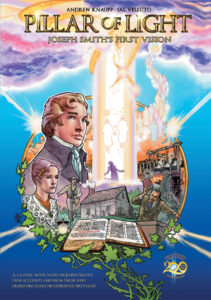 034) Pillar of Light: Joseph Smith’s First Vision by Andrew Knaupp and Sal Velluto, finished May 3
034) Pillar of Light: Joseph Smith’s First Vision by Andrew Knaupp and Sal Velluto, finished May 3
My copy arrived horribly damaged, so it’s heading back home (to the graveyard) on tomorrow’s brown truck, but rather than waiting for the replacement, went ahead and read this copy.
It’s good. For some reason I expected it to be a bit longer, incorporating as it does all known sources, but the comics-portion of the book is only 26 pages long. Made in Sal Velluto’s classic 80s/90s style (perhaps seen most famously in Black Panther) and some late 2010s-style too-much-Photochop colors by scriptwriter Knaupp (whom I don’t know), the visuals are arguable a bit over-the-top. Honestly, I was braced for them being waaaay over-the-top, but they’re not that much. At the end, where they talk about the steps in making the comic, I rather wish they had stopped the colors with the flat step (and maybe tried out not inking Sal’s gorgeous pencils?), but I know that my tastes are maybe the not the most commercial.
Anyway, as I said, it was good. I’m glad it exists and I’m a bit curious now about other titles from this publisher which, previously, I mostly knew for reissuing the Allreds’ Golden Plates (and possibly releasing some previously unpublished??).
Definitely worth checking out. Certainly the sort of book grandparents want to send grandchildren.
not long
===========================================================
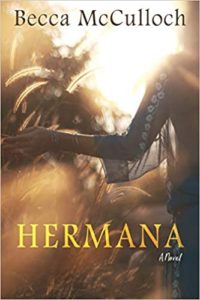 035) Hermana by Becca McCulloch, finished May 13*
035) Hermana by Becca McCulloch, finished May 13*
A day or two ago I finished rereading Doug Thayer’s essay about “serious” Mormon fiction. My feelings about the essay, while largely positive, remain conflicted. I thought of this essay—and specifically its claim that the novelist it’s prophesying “will probably be a woman”—as I finished Hermana. The little I know of McCulloch‘s biography puts her in Thayer’s imaginative ballpark, and this novel is a very nice opening salvo should she prove to be one of our greats.
Hermana is a melodrama—but I don’t mean this as a pejorative, nor do I mean to imply that its emphasis on emotional beats preempts development of character or anything else. But thinking of the novel as a melodrama I think allows us to celebrate what it does well.
And it does do things well.
Looking for something else recently I ran across Scott Hale‘s warnings to missionary-fiction writers. Scott’s read a lot more missionary fiction than I have, but definitely I have read enough to know these bits of advice are accurate. I am ignorant enough, however, that I won’t be able to tell if ol’ Becca’s followed, oh, #2: “You stand a better chance of writing a good Mormon missionary story if you take the time to read Mormon missionary fiction written by other writers first.”
(#2, incidentally, is why I won’t write missionary fiction. I just don’t know. It’s also why my opinions here may not be as informed as you might like.)
I suspect so, however. I at least have never read a missionary novel that starts with arriving in the field and ends* one year in. Which was a daring but sensible choice and provided a satisfying denouement that otherwise would have been impossible.
Although… *it actually does not end there. An additional chapter (let’s call it an epilogue) picks up to bring her through her last day and her arrival at her home airport. This chapter has some beautiful writing and wraps up an ongoing metaphor in a lovely way, but I’m not sure it makes the book itself better. Maybe it does. Maybe it doesn’t. This is the sort of thing a vigorous discussion between writer and editor could have resolved in such a way that I wouldn’t be bringing up the issue right now, but alas.
The lack of an editor is plain throughout this novel. ‘Tis our modern plague. The prose is melody and propulsive and worthy of our good report, but small errors abound from wrong-pointing apostrophes to people with their arms full picking things up to someone whose head is already lying upon a shoulder lying a head upon a shoulder. (The reliance of heads upon shoulders also suggests more work for an editor: push the writer to find more business for characters to do.)
But these are little things. Perhaps this book will sell enough copies to justifying a Tenth Anniversary Special Edition with the addition of big lizards in the desert and the subtraction of these little goofs.
The basic arc of the story takes our hermana from the low that sends her on a mission to a realization that she is what God wants as part of his “motley army—perhaps the only kind God ever assembles” (224).
The emotional highs and crashes of the novel that led me earlier to label it melodrama largely make sense—especially considering this is narrated in first person. Perhaps a more distant narrator could have navigated our hermana’s highs and lows with more gentleness, but as she is lifted to peaks and then crushed beneath them, her narration follows her feelings. Some readers will probably find that difficult, but it makes sense. (Whether first-person was the right choice is a different argument and one you are not prepared for, not having read it yet. Another example is Hermana Lewis’s overuse of the work “misogyny”—inappropriate for a third-person narrator, but it makes sense in first-person and tells us a lot about how many tools she has on-hand to navigate her world.
The lyrical prose, the smart constraints on time, the honesty of emotion, and the elegant deployment of spiritual elements (an essay in itself) make this a significant entry in the Mormon-lit scene—even if it does no more than announce its author’s presence and make us look forward to her next.
at most two weeks but I think I rushed through it much more quickly than that

